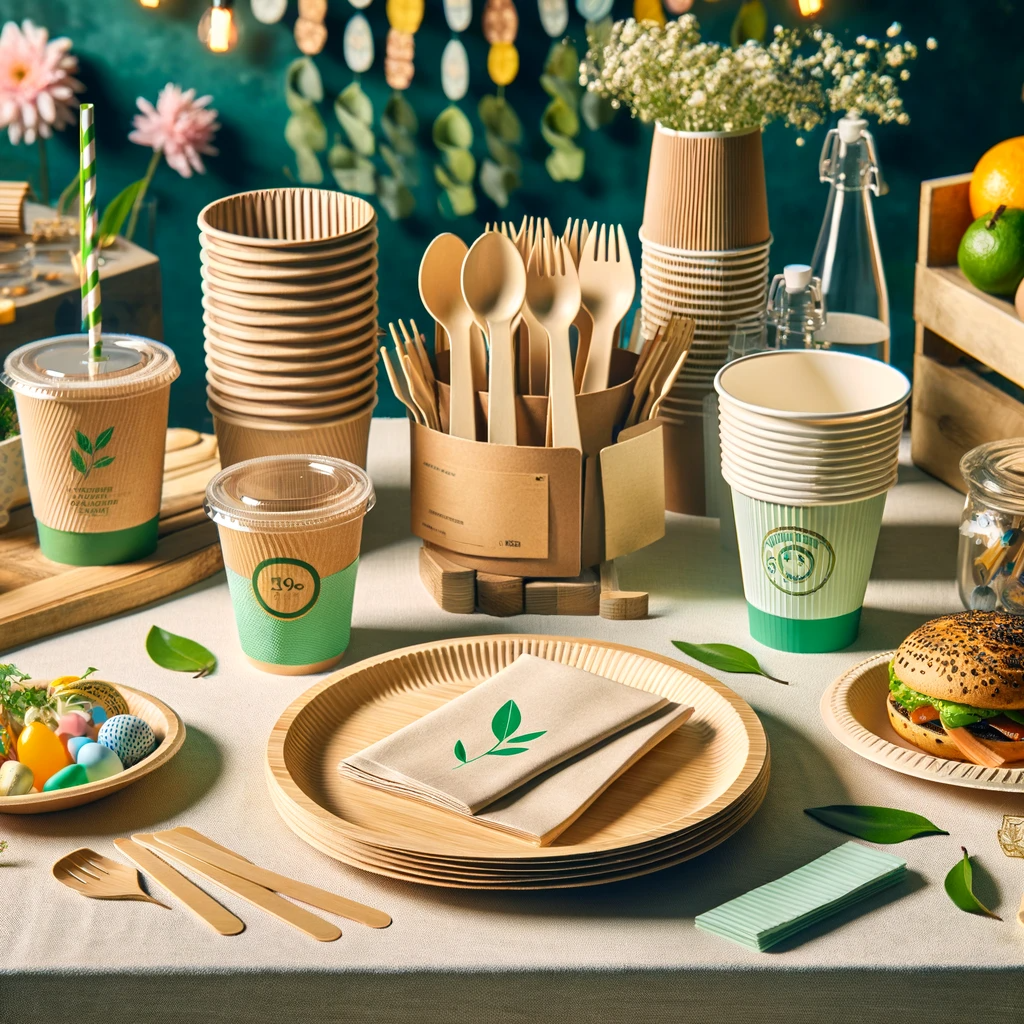
Exploring Top Eco-friendly Innovations in Catering Supplies
Share
The catering industry has been undergoing a significant transformation to become more eco-friendly. This shift is primarily driven by consumer demand for sustainability and the increasing awareness around the detrimental effects of plastic waste on our environment. Here, we will delve into some of the most promising eco-friendly innovations in catering supplies that are shaping the future of sustainable dining.
Biodegradable and Compostable Utensils
Catering companies are shifting from traditional plastic utensils to biodegradable alternatives made from plant-based materials like cornstarch or bamboo. These utensils have a similar look and feel to plastic but break down naturally in a composting environment after use.
- Bamboo cutlery: Bamboo is a renewable resource that grows quickly, requiring less water and no pesticides to cultivate. It is also naturally anti-bacterial, making it ideal for food service.
- Cornstarch cutlery: Another popular alternative is utensils made from polylactic acid (PLA), which is derived from cornstarch. Although they look like plastic, PLA utensils are compostable under commercial composting conditions.
- Wooden cutlery: Wooden forks, spoons, and knives are durable and can be easily composted after use.
Eco-friendly Plates
Disposable plates are common in catering situations, but their environmental impact can be substantial. A variety of eco-friendly alternatives exist on the market today:
- Palm leaf plates: Made from fallen palm leaves that have been cleaned and pressed into shape, these plates are 100% natural and biodegradable.
- Sugarcane bagasse plates: Bagasse is a byproduct of sugar cane processing which can be molded into sturdy disposable plates or bowls that are both biodegradable and compostable.
- Wheat straw fiber plates: These plates are made from wheat straw fibers, a waste product from wheat farming. They are sturdy and can withstand both hot and cold foods.
Sustainable Napkins
Caterers are also moving towards napkins made from recycled materials or sustainably sourced fibers. Some examples include:
- Bamboo napkins: These are made from bamboo fiber, which is highly absorbent and yet easily compostable.
- Recycled paper napkins: These are made from post-consumer waste paper, reducing the demand for virgin pulp.
The Rise of Eco-friendly Serving Tongs
In recent years, serving tongs made from PLA or other compostable materials have emerged as an eco-friendly alternative to traditional plastic tongs. Not only do these tongs perform just as well as their plastic counterparts, but they also significantly reduce the catering industry’s environmental footprint by offering a renewable and compostable option.
Eco-technology innovation in catering supplies offers solutions that are both practical and environmentally responsible. As the industry continues to evolve, it is clear that sustainability is more than just a trend—it’s the future of catering. These innovations demonstrate that it’s possible to meet consumer needs while minimizing harm to our planet.
As eco-technology continues to advance, a new breed of sustainable catering supplies is being introduced to the market. Among these innovations, tasting sporks and plates have captured consumers’ attention due to their eco-friendly design and functionality.
Tasting sporks, a combination of a spoon and a fork, are becoming increasingly popular in catering services. These utensils are designed for single-bite servings or tasting portions at events. What sets them apart is that they are made from materials like bamboo or compostable plastic instead of traditional plastic.
Advantages of Eco-friendly Tasting Sporks
Here are some advantages of these eco-friendly tasting sporks:
- Sustainability: Since these utensils are made from renewable resources, they effectively reduce our carbon footprint.
- Biodegradable: These sporks can be composted after use, so they don’t add to landfill waste.
- Convenience: They offer the functionality of both a spoon and fork, making them perfect for serving appetizers or desserts.
Eco-friendly plates have also caught caterers’ attention with their unique selling proposition: sustainability without compromising quality. Made from materials like palm leaves or bagasse (sugar cane pulp), these plates are durable enough for any event but can be composted after use.
Features of Eco-Friendly Plates
Below are some notable features of these revolutionary dining ware:
- Durability: Despite being made from natural materials, these plates are sturdy and can handle hot or cold food without breaking.
- Versatile Design: These plates come in various sizes and shapes making them suitable for different types of events.
- Compostable: Once discarded, the plates naturally break down in a compost pile within three months.
While it’s true that traditional plastic utensils and plates have been more economical options for the catering industry up until now, the long-term environmental damage is significant. Today’s consumers are increasingly aware of these issues and many are willing to pay a premium for eco-friendly options.
Moreover, businesses that adopt sustainable practices often find they receive positive feedback and can position themselves as industry leaders. By investing in eco-technology innovation such as tasting sporks and plates, caterers can not only meet the growing demand for sustainable dining options but also contribute to a more sustainable future for our planet. In the long run, the benefits of adopting these green products far outweigh the initial costs.
The era of sustainable dining is upon us. As the awareness of our environmental footprint grows, the catering industry has been forced to rethink its approach to serving food. The result? An innovative range of eco-friendly plates and catering utensils designed to minimize waste and environmental impact.
Eco-friendly plates are not only beneficial for the environment but offer a host of advantages for catered events as well. They are typically made from renewable resources such as bamboo, palm leaves or bagasse—an agricultural byproduct from sugar cane refining. These materials are biodegradable, which means they decompose naturally over time without harming the environment.
Here’s a look at some popular options in sustainable plate ware:
- Bamboo Plates Bamboo plates are sturdy, stylish, and naturally antimicrobial—making them perfect for any event.
- Palm Leaf Plates Made from fallen palm leaves, these plates come in unique shapes and beautiful textures that add visual appeal to your table setting.
- Bagasse Plates Bagasse is a byproduct of sugar cane production. It’s used to make strong, durable plates that can withstand hot foods and liquids without leaking or becoming soggy.
The shift towards sustainability doesn’t end with plates. It extends to catering utensils as well. Traditional plastic utensils contribute significantly to landfill waste and are difficult to recycle due to food contamination. Eco-friendly alternatives like wooden or compostable utensils provide an excellent solution to this issue.
Some notable eco-friendly utensil options include:
- Wooden Cutlery Crafted from birchwood, these utensils are fully compostable and provide a unique aesthetic touch compared to typical plastic cutlery.
- Compostable Utensils Made from plant-based materials like cornstarch or potato starch, these utensils can be composted after use, significantly reducing waste.
- Edible Cutlery This revolutionary innovation combines food and cutlery into one. Made from grains, these edible utensils can be eaten after use or will decompose naturally if thrown away.
In summary, the catering industry is embracing the new era of sustainable dining by innovating in eco-friendly plates and utensils. By choosing these options, caterers can provide a unique dining experience with minimal environmental impact. This trend is not only a response to increasing environmental consciousness but also an opportunity for the catering industry to redefine its relationship with nature.
The rise of sustainability awareness has greatly impacted various industries, including the catering business. Conscious efforts to reduce waste and preserve the environment have led to notable innovations, particularly in the production of disposable items. Among these, the transformation of cocktail and dinner napkins stands out. In this green era, we are witnessing a shift from traditional paper-based products towards more eco-friendly alternatives.
Previously, disposable napkins were predominantly made from virgin paper which contributes to deforestation. Not only do these traditional napkins require a significant amount of water for production, but they also result in high energy consumption due to their bleaching process which is harmful to both humans and the environment.
Today’s eco-friendly cocktails and dinner napkins are made from diverse materials including:
- Recycled Paper: These napkins are typically unbleached and biodegradable. They are produced without cutting down new trees which conserves forests.
- Bamboo: Bamboo grows faster than most trees, making it a renewable resource. It requires less energy during production compared to conventional paper.
- Organic Cotton: Reusable cotton napkins reduce waste as they can be washed after use. These types of napkins also have a longer lifespan compared to single-use ones.
In addition to material changes, there have been advancements in manufacturing processes. Many companies now utilize hydroelectric power or other sustainable energy sources during production to minimize their environmental impact.
Let’s take a look at some top manufacturers leading this green evolution:
Seventh Generation: Known for its commitment towards sustainability, Seventh Generation offers 100% recycled unbleached paper napkins.
Bamboodlers: This brand offers disposable bamboo-based cocktail and dinner napkins that are biodegradable and compostable.
Bambu Home: Their organic cotton cloth napkins promote reuse over single-use disposables.
As we move further into the green era, the catering industry has a significant role to play in promoting sustainability. The evolution of cocktail and dinner napkins represents an important step in this direction. The key for manufacturers will be to continue their innovative efforts and develop products that not only meet the practical needs of consumers but also contribute to the preservation of our environment.
With eco-conscious consumers increasingly demanding sustainable alternatives, we can anticipate further growth and progress in this sector. Through these advancements, we can look forward to a future where dining experiences are not only enjoyable but also environmentally responsible.
The Role of Serving Tongs in Today’s Eco-friendly Catering Industry
The catering industry is undergoing a major transformation, with numerous businesses and consumers clamoring for more environmentally friendly options. Among these eco-conscious shifts, serving tongs have risen to the forefront as an instrumental tool in promoting sustainability.
The Importance of Eco-Friendly Serving Tongs
Serving tongs are a staple in the catering industry, used widely across buffet setups, salad bars, and other food service stations. However, conventional ones are often made from plastic or metal materials that are not only non-biodegradable but also require significant energy to produce.
Today’s eco-friendly serving tongs address these issues directly. They are typically made from renewable or recycled materials like bamboo and stainless steel, which substantially reduces their carbon footprint. Moreover, they’re designed to be hard-wearing and long-lasting to minimize waste.
Types of Eco-Friendly Serving Tongs
There is a variety of eco-friendly serving tongs available on the market today:
- Bamboo Tongs: Bamboo is a highly renewable resource that grows rapidly without needing large amounts of water or harmful pesticides. Bamboo tongs are not only sustainable but also incredibly durable and heat-resistant.
- Stainless Steel Tongs: Although the production of stainless steel requires energy, its durability and longevity make it an eco-friendlier option than plastic. Stainless steel tongs can be reused for years, reducing the need for replacements and minimizing waste.
- Compostable Plastic Tongs: Made from plant-based materials like cornstarch, these types of serving tongs can be composted at their end-of-life stage instead of ending up in landfills.
Making a Sustainable Choice: Factors to Consider
Choosing sustainable serving tongs involves considering several key factors:
- Material: Opt for serving tongs made from renewable or recycled materials like bamboo or stainless steel.
- Durability: A good-quality pair of tongs should last for several years. Investing in a durable set not only represents good value for money, but also reduces waste.
- End-of-Life Options: Consider what will happen to the tongs once they’ve reached the end of their life. Compostable plastic tongs can be composted, while bamboo and stainless steel options can be recycled.
By shifting towards sustainable serving tongs, catering businesses can significantly reduce their environmental impact without compromising on functionality or style. This simple shift can make a big difference, signaling a commitment to sustainability and potentially influencing others in the industry to do the same.
